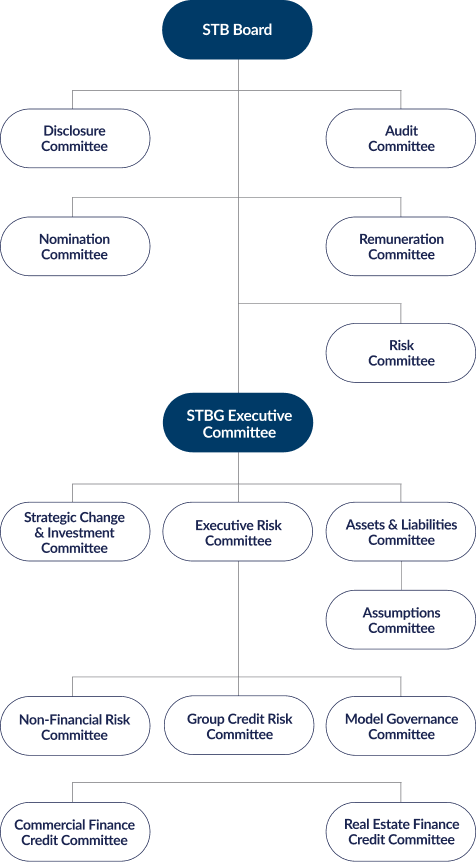Corporate Governance
Always acting with integrity and transparency to deliver value for all our stakeholders
The Board is committed to maintaining and developing high standards of corporate governance. The Board endorses the principles of openness, integrity and accountability which underlie good corporate governance. The Group is compliant on an ongoing basis with the listing rules and describes its compliance with the UK Corporate Governance Code (the 'Code') and provides specific information to shareholders about this.
Further information about Secure Trust Bank's corporate governance arrangements and how the Group has applied the principles of the Code can be found in the Annual Report and Accounts available at the Results and Reports section of this website.
Secure Trust Bank Governance

Board Accountability - Committees
The Board has established Nomination, Remuneration, Audit and Risk Committees, each with formally delegated duties and responsibilities and with written terms of reference. From time to time, other committees may be set up by the Board to consider specific issues when the need arises. The Board maintains a schedule of matters reserved.
The Risk Committee reviews the design and implementation of risk management policies and risk related strategies and the procedures for monitoring the adequacy and effectiveness of this process; considers the Group's risk appetite in relation to the current and future strategy of the Group; oversees the Group's ICAAP and ILAAP and outputs from these; and exercises oversight of the risk exposures of the Group. The Risk Committee meets a minimum of four times a year, plus ad hoc meetings as required.
The Remuneration Committee assists the Board in performing its responsibilities in relation to remuneration, including, amongst other matters, making recommendations to the Board on the Company's policy on executive remuneration, determining the individual remuneration and benefits package of each of the Executive Directors, the Company Secretary and other Material Risk Takers and for reviewing and making recommendations regarding the terms and conditions of employment, remuneration and benefits of other employees of the Group. The Remuneration Committee meets formally at least twice a year and otherwise as required.
The Nomination Committee assists the Board in discharging its responsibilities relating to the structure, size and composition of the Board. The Nomination Committee is responsible for, amongst other matters, evaluating the balance of skills, knowledge, independence, experience and diversity of the Board, and makes recommendations to the Board on such matters. The Nomination Committee also considers succession planning, taking into account the skills and expertise that will be needed on the Board in the future. Meetings are held at least twice a year and otherwise as required.
The Audit Committee assists the Board in, amongst other matters, discharging its responsibilities with regard to regulatory reporting, financial reporting, including reviewing the Company's annual financial statements, reviewing and monitoring the extent of the non-audit work undertaken by external auditors, advising on the appointment, reappointment, removal and independence of external auditors and reviewing the effectiveness of the Company's internal audit activities, internal controls and risk management systems. The ultimate responsibility for reviewing and approving the annual report and accounts and the half-yearly reports remains with the Board. The Audit Committee meets formally at least four times a year and otherwise as required.
Division of Roles
- Provides leadership of the Board and is responsible for its overall effectiveness in directing the Company
- Facilitates constructive board relations including the effective contribution of all non-executive directors
- Engages with the Company Secretary to ensure that the Board receive accurate, timely and clear information
- Provides leadership to the Group
- Develops and recommends strategy and long-term objectives of the Group for approval by the Board
- Responsible for the day-to-day management of the Group
- Chair of the Executive Committee, making decisions affecting the operation, performance and strategy of the Group
- Available as an alternative avenue of communication between shareholders and the Board
- Act as a sounding Board for the Chairman
- Responsible for reviewing the effectiveness of the Chairman
- Acts as an intermediary for the other directors
- Development and delivery of the Group's strategic aims
- Monitors and manages financial and operational performance
- Oversight of management of risk within risk appetite
- Supports the Board by overseeing and delivering the Group's strategy and the day-to-day management of the business
- Reviews and develops all material matters prior to the Board, making recommendations to the Board and its Committees for approval
- Provide independent and constructive challenge
- Monitor and review the performance of the executive directors
- Offer specialist advice to the board based on their experience obtained in sectors relevant to the business
- Undertake a prime role in the appointment of executive directors
- Hold to account performance of management and individual executive directors against agreed performance objectives
- Ensures, in collaboration with the Chairman, that the Board receive information in a timely fashion and that all processes are in place to ensure that the Board can function effectively
- Available to all directors to provide advice
- Responsible for advising the Board on all governance matters
